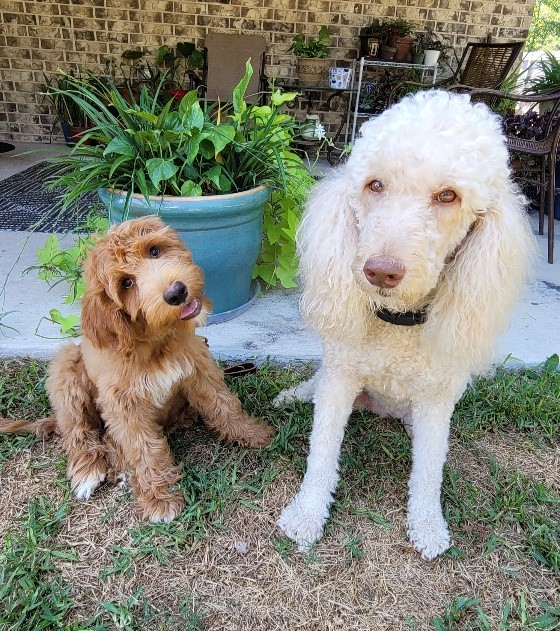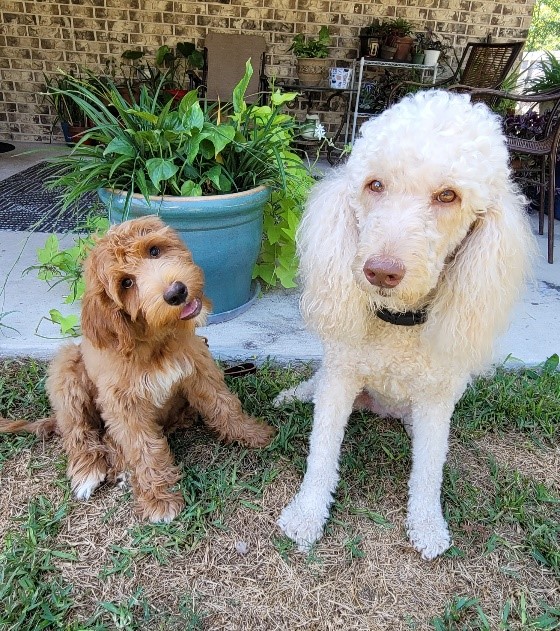For the disability-affected person who seeks companionship along with practical assistance, the service dog is far superior to any inanimate tool. But though it’s a hard fact to face with any companion animal, a service dog is also likely to grow old before its handler—and unlike a cane or mobile device, it can’t just be shelved in favor of a new model.
To answer the question, “What happens to service dogs after they stop working?” BridgingApps turned to Jennifer Wright, PsyD (Service and Companion Dog Coordinator at Easter Seals Greater Houston), and to trainer Allie Keaton (Founder and President of My Service Dog., Inc.)

Q: What are some advantages of having a service dog to begin with?
A: A qualified service dog performs many tasks—retrieving items, helping its handler maintain personal space, even notifying caretakers or family members should there be a need for emergency assistance. But regardless of specifics, every service dog has one central task: caring for its human and making the person’s life easier.
At Easter Seals Greater Houston, we have the honor of connecting military families with four-legged “angels on earth.” The work of our dogs is essential in improving quality of life for individual Veterans—and no less for their family caretakers, who find significant relief in having help with essential tasks. Hence, we firmly believe the entire family is to be included in the decision to welcome a service dog into the home.
Once placed, the service dog is a perfect model of patriotism, pride, and unconditional giving—a true superhero—when caring for his or her Veteran. Nonetheless, there inevitably comes a time when service dogs become too old to work, or suffer an illness, injury, or trauma that leaves them unfit. It’s then that retirement, not to mention finding a replacement dog for the human family, must be considered.
Easter Seals Greater Houston Veterans Service Dog Program
Q: How do you decide when a dog is ready to retire—is it more than a matter of reaching a predetermined age?
A: It’s hard even to state a typical age when “most” service dogs retire. There are a multitude of factors to consider: health, breed, size, and genetics, to name just the most common. And even while a dog is young and healthy, we can’t rule out the possibility of unexpected developments forcing early retirement. For example, service dogs have been known to develop unforeseen anxieties that stop them from performing their tasks.
Regardless, each service dog organization has its own retirement process and standards. The important thing is doing what’s best for each individual dog as well as for every human involved.
Q: So what happens after a dog is ready for retirement? How do they spend their remaining years?
A: We like to have service dogs personally train their replacements, whenever possible. An experienced dog is invaluable in introducing new “recruits” to daily routines and living quarters. Not to mention helping the new dog get acquainted with its assigned humans (and vice versa).
After retirement, we normally favor letting the dog remain with the family it knows and loves. If that proves impractical—if the dog develops special health needs, if simultaneously caring for retired and working service dogs would be financially prohibitive—our advice is to look first to people who are already well acquainted with the dog. Friends or extended-family members are often able to take a retired dog in. The next choice would be rehoming the service dog as a companion dog elsewhere, perhaps with another family in our Veterans program.
Ultimately, what’s most important is that the dog be able to live out his or her life surrounded by top-quality care, companionship, and understanding. After a service dog has invested years of dedication in a human family, the least we can do is return the favor.
P.S. Families with a general interest in dogs and other pets may enjoy these apps:

